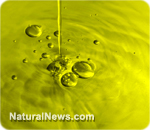Bacteria could make car fuel from thin air
Friday, November 26, 2010 by: David Gutierrez, staff writer| Ads by Google | |||
| Fuel Oil Additives optimize combustion and reduce emissions and boiler corrosion www.pentol.com | Green Fuels - Biodiesel Safe, reliable, automated home and commercial biodiesel processors www.greenfuels.co.uk | Fuel Cell Earth LLC Supplier of all your Fuel Cell needs we also treat carbon products www.fuelcellearth.com | Hydrogen Storage PEMFC&GC reliable safety H2 source Design and manufacture H2 storages www.hbank.com.tw |
| ||||||||||
The bacterium in question, Azotobacter vinelandii, produces an enzyme known as vanadium nitrogenase to remove nitrogen from the air and turn it into ammonia. In the new study, researchers found that when the enzyme was deprived of nitrogen and oxygen but supplied with carbon monoxide, it instead produced two-to-three-atom carbon chains of propane.
Propane is a hydrocarbon used to fuel gas stoves. Researchers believe that the enzyme could be modified to produce longer hydrocarbon chains of vehicle fuels.
"Obviously this could lead to new ways to create synthetic liquid fuels if we can make longer carbon-carbon chains," researcher Markus Ribbe said.
The technology is promising because cars emit carbon monoxide from their tailpipes, suggesting that some of those emissions could be reused to make modern fuels more efficient. In addition, carbon monoxide can be easily produced by removing carbon dioxide from the air and splitting off one oxygen atom.
Rising levels of atmospheric carbon dioxide are the primary cause to global warming.
"Two hundred years of burning fossil fuels and cutting down large tracts of forest has increased the atmosphere's carbon dioxide content from about 280 parts per million to over 350 parts per million," writes Ervin Laszlo in the book Quantum Shift in the Global Brain.
"In Siberia, an area of permafrost spanning a million square kilometers, the size of France and Germany combined, has started to melt for the first time since it formed at the end of the last ice age 11,000 years ago."
As exciting as it may sound to have cars that pull as much carbon dioxide out of the air as they put back in, the researchers warn that industrial applications are still a long way away. A primary obstacle is finding ways to produce and store vanadium nitrogenase in any significant quantity.
Reposted From NaturalNews






